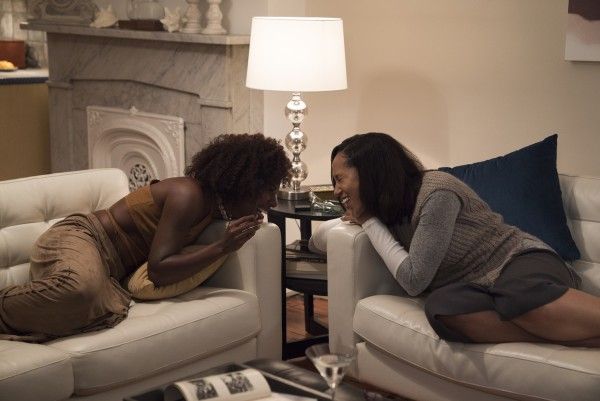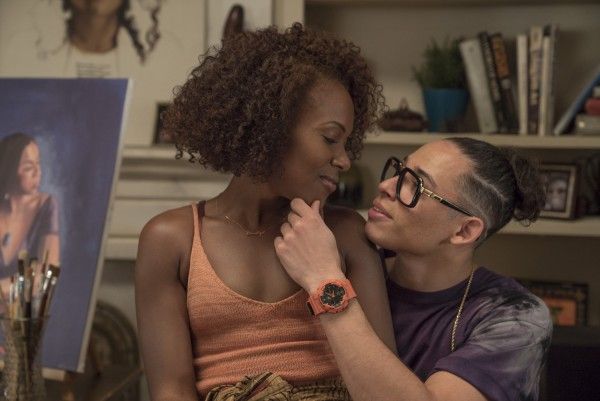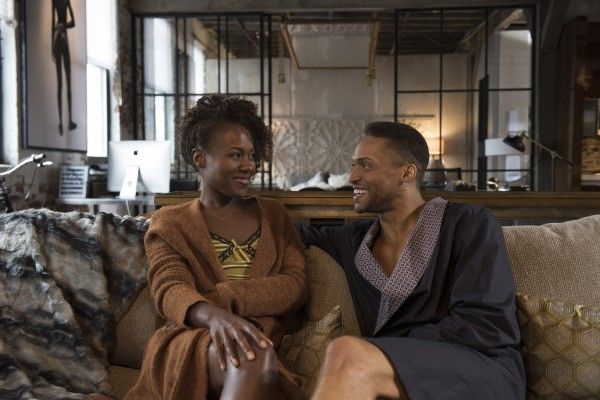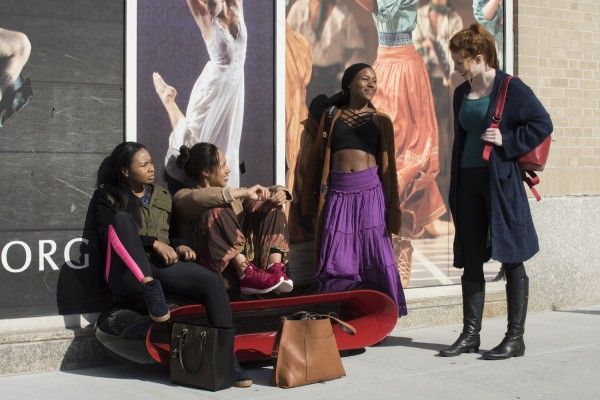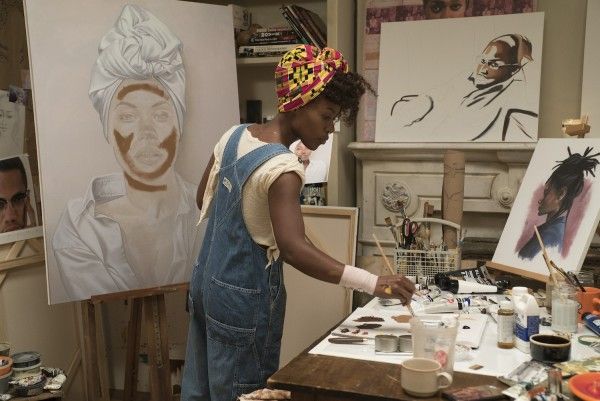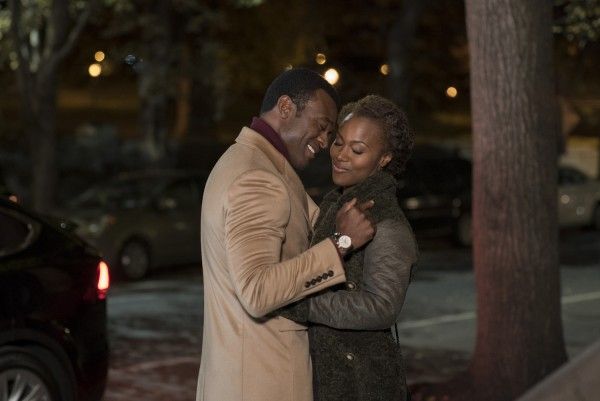Not unlike Twin Peaks: The Return, Spike Lee's new Netflix comedy series, She's Gotta Have It, simultaneously represents a summation and an expansion of the legendary filmmaker's style and thematic obsessions. And like David Lynch, Lee has returned to his origins to push his art forward, reinventing his groundbreaking 1986 debut of the same name. The crucial difference is that where Lynch has continued to venture into the unknown and otherworldly, Lee has fully embraced the here and now, indulging stylistic notions that reflect memes and hashtags as well as a revitalized focus on toxic masculinity, the rampant gentrification of New York City, and the gig economy.
It's also a series that is unapologetically black and proud. In detailing the life of Nola Darling (DeWanda Wise), a young Fort Green artist who works a number of odd jobs to make ends meet, Lee conveys a potent love for black artists and intellectuals from all corners of the spectrum, and is not timid in his celebration. In one scene, a lyricist on the soundtrack lists famed black icons from the five boroughs, from the late, great Gregory Hines to hip-hop legends the Fat Boys, and Lee lets each name appear and fade on the screen. On a date, Nola's most business-minded suitor, Jamie Overstreet (Lyriq Bent), gifts her a copy of Claudia Rankine's "Citizen" and later on, Darling speaks about the influence of painter Kerry James Washington and the photographer LaToya Ruby Frazier on her work with Opal Gilstrap (Ilfenesh Hadera), her friend and occasional lover.
Even more striking is how Lee intercuts scenes with album or single artwork to credit the artists and songs he's using to help tell his story, ranging from Solange Knowles and Sade to John Coltrane & Johnny Hartman and Brian McKnight. For however disorienting small stylistic nods like this are initially, they are bold proclamations not only of influence and gratitude but the collaborative nature of Lee's work and filmmaking in general. Unlike arguably any other narrative TV or streaming series currently being produced, She's Gotta Have It shows a fearless consciousness about its own creation that's never used to excuse lazy writing, gimmicky jokes, or preordained plot turns.
It's difficult to assess if the series has a plot at all outside of the misadventures and day-to-day life of Nola. Lee's original film centered on Nola and her three male suitors, and that does account for much of what happens in the series. Aside from Jamie, there's Greer Childs (Cleo Anthony), a vain, self-obsessed photographer, and Mars (Anthony Ramos), a wise-cracking bike messenger who was played by Lee himself in his debut film. Each man reflects a unique kind of attraction for Nola -- Mars is the funny one, Greer is a perfect physical specimen, and Jamie is the intellectual and the most familiarly mature of the bunch. Thanks both to the high caliber of performers that inhabit these roles and the uniformly brilliant writing, none of them are simply defined by what Nola finds attractive about them. They each come off as a complex being with arrays of talents and hang-ups that become increasingly hard to ditch.
Lee's almost exclusively female writing staff knows how to write men both empathetically and with the sobriety of experience, but its the depth of character that they give Nola, her girlfriends, and the community of Brooklyn that makes this thing sing. Nola's interactions with Mars, Jamie, and Greer take up a healthy portion of the series, but there's just as much focus on Nola's working life, her community, and, most notably, the female form. That's not to say that the show's frank and distinctly physical depictions of sex approaches leering, but rather that the series is constantly aware of how a woman's body is being judged, taken in, and claimed without permission by even the most seemingly well-meaning of men. In the series' fantastic third episode, the purchasing of a boutique black dress at once allures Nola's boyfriends and makes them irrationally possessive, critical without cause or reason, and plainly creepy. Elsewhere, one of Nola's best friends must convince her employer, a former rapper turned upscale supper club manager (Joseph Antonio Cartagena, AKA Fat Joe), for money to get ass implants in the hopes of becoming part of the club's burlesque routine. Lee films his home turf with energy and dense knowledge of every corner, bodega, and music spot in the borough, but it's the writers that map the complexity, joy, and unending frustration of female experience under the gaze of pompous men with such vibrancy and insight.
The organic yet bracingly modern way that Lee and his creative team convey how fiscal and political instability can amplify personal instability and self-doubt is something that the series handles with unique aplomb. For Nola as well as, I suspect, Lee, art in its manifold forms is at once a portal for expression and self-understanding but it's neither reliable nor predictable. The matter of money is never far from actions in She's Gotta Have It, and Nola's reliance on her many suitors for food, companionship, rent, and sex never comes easily. At the center of Nola's bustling lifestyle is a struggle between self-determined identity and the occasionally bruising comfort that men and women alike afford her. Lee, his performers, and the writing staff's greatest accomplishment is making this conflict at once relatable and movingly personal.
To a degree, that extends even to the setting. She's Gotta Have It is indeed a New York show in a similar vein as HBO's High Maintenance or even Seinfeld. There's a level of humor and detail in the series that people who have lived in the city will get more than those who have not found themselves drunkenly stumbling home down Front St. while shoving a dollar slice or an egg sandwich from the corner deli. Familiarity with Brooklyn and the rest of the boroughs is helpful but is under no circumstances a requisite to understand what Nola is going through in her romantic and professional relationships.
She's Gotta Have It melds Lee's studied vision of Brooklyn in the age of sexting with the intimate yet ubiquitous inner thoughts and feelings of a generation of young, black artists and professionals without overtly praising or diminishing either. The series lives in the thrilling mess between the home that Lee knows in his very blood and the alien landscape that new technologies and business, as well as the unthinkable amounts of money that comes with both, that its slowly evolving into. Rather than simply indulge his own love and defensive nostalgia for where he came from, Lee looks toward the future and largely embraces it -- but doesn't pretend like there isn't still a long way to go.
Rating: ★★★★★ -- Excellent
She's Gotta Have It hits Netflix in full on Thanksgiving Day.


